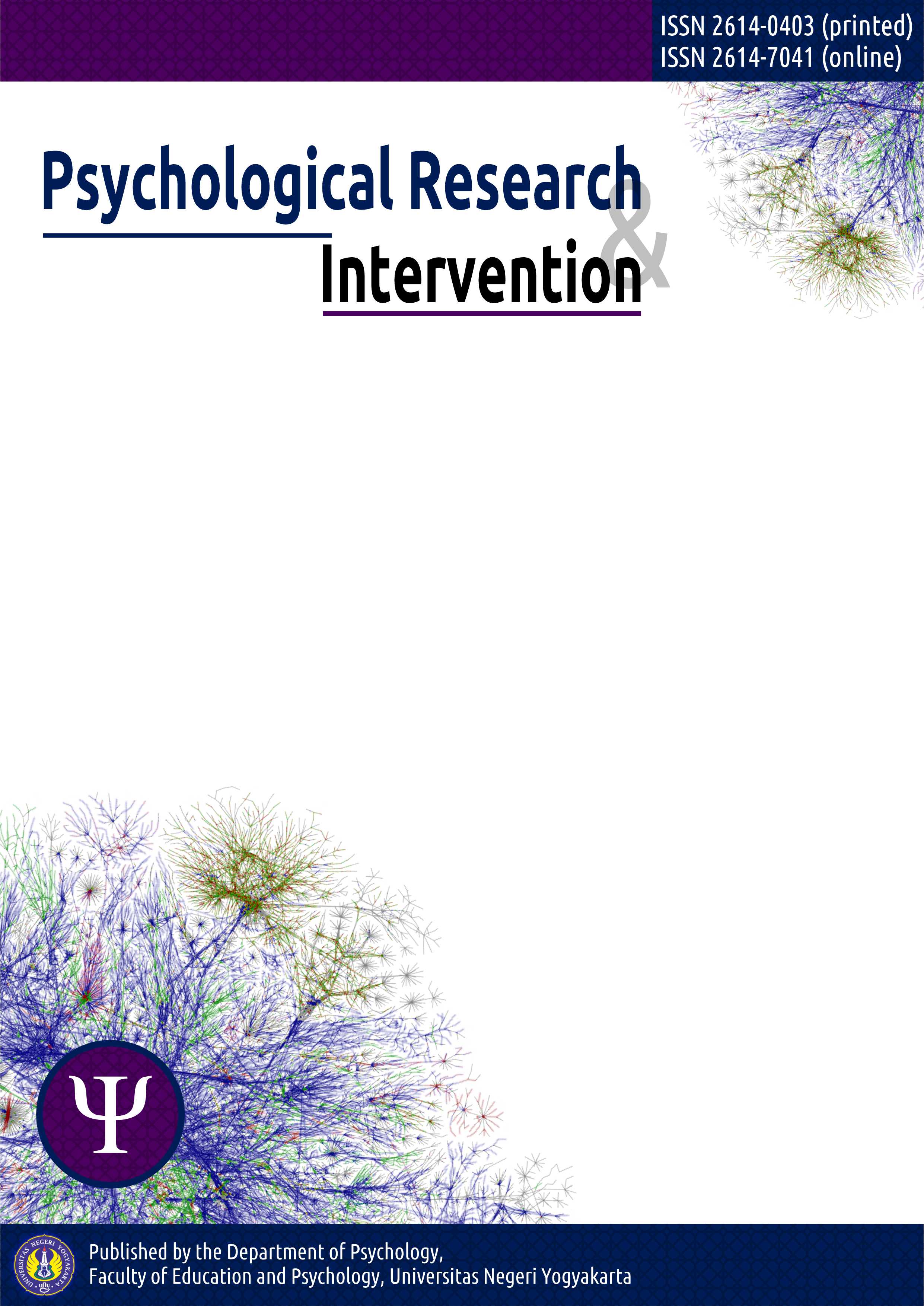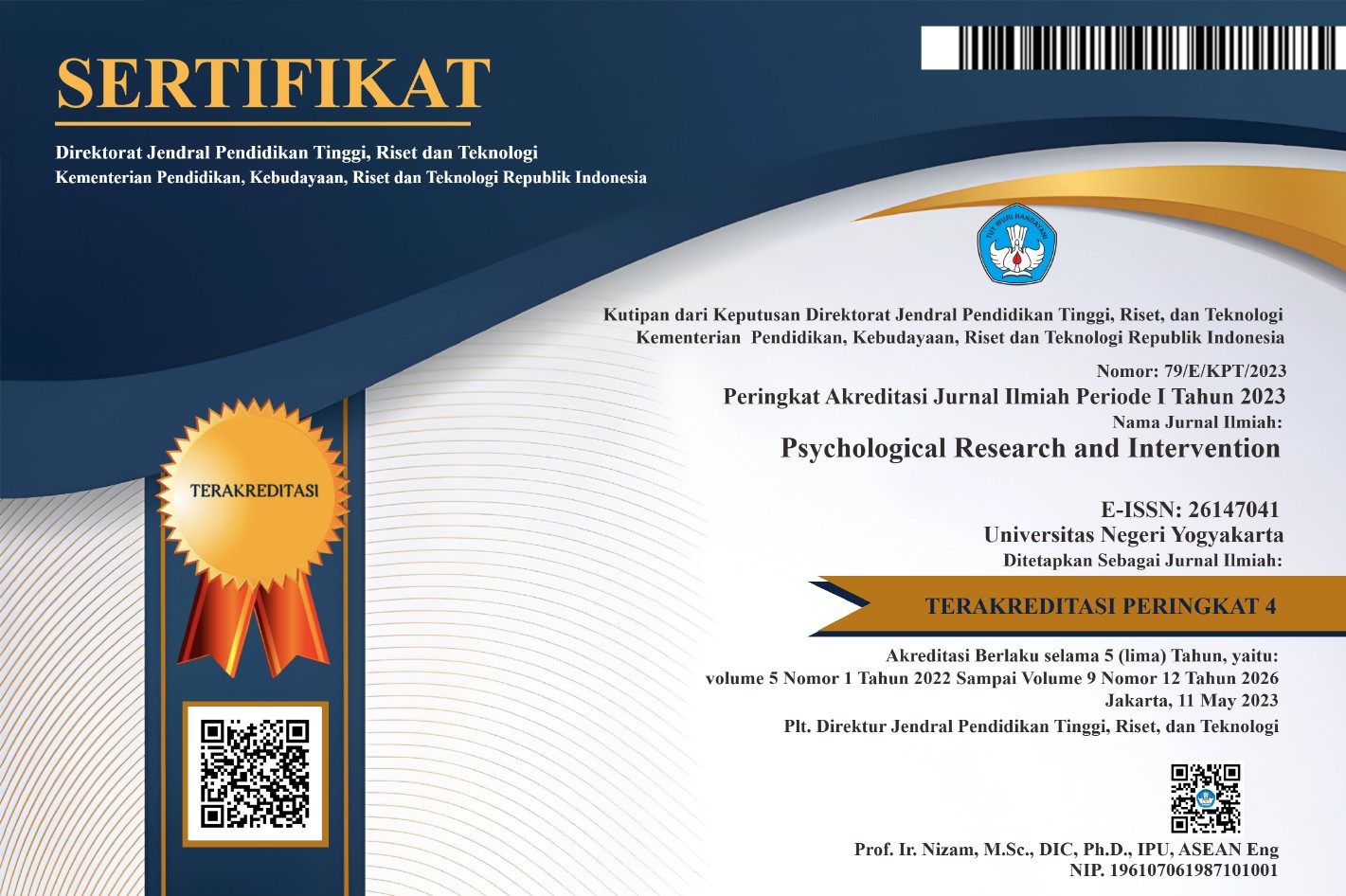Psychological Well-being of Individuals Living A Minimalist Lifestyle: A Phenomenological Study
DOI:
https://doi.org/10.21831/pri.v8i1.78923Keywords:
minimalism, minimalist lifestyle, psychological well-beingAbstract
The minimalist lifestyle has gained popularity among the public due to its widespread information across various platforms. Minimalism, a way for individuals to live their lives simply, orderly, and elegantly, is closely related to their psychological well-being. This study aims to explore the reasons, processes, and benefits of psychological well-being associated with a minimalist lifestyle. This research adopts a qualitative approach using a phenomenological method and involves four minimalist individuals (over 24 years old) from different regions of Indonesia. Data collection involved interviews and literature review. Data analysis techniques included data reduction, data presentation, and conclusion drawing. The study results indicate that participants perceived minimalism as a lifestyle focused on simplicity, minimizing various aspects of life, and making the most of it. Participants reported experiencing improved well-being after embracing a minimalist lifestyle, including greater self-acceptance, positive relationship quality, self-autonomy personal growth, environmental mastery, and life goals.
References
Bardey, A., Booth, M., Heger, G., & Larsson, J. (2021). Finding yourself in your wardrobe: An exploratory study of lived experiences with a capsule wardrobe. International Journal of Market Research, 64(1), 113–131. https://doi.org/10.1177/1470785321993743
Bryson, H., Mensah, F., Price, A., Gold, L., Mudiyanselage, S. B., Kenny, B., Dakin, P., Bruce, T., Noble, K., Kemp, L., & Goldfeld, S. (2021). Clinical, financial and social impacts of COVID-19 and their associations with mental health for mothers and children experiencing adversity in Australia. PLoS ONE, 16(9 September). https://doi.org/10.1371/journal.pone.0257357
Chabot, A. (2020). The pursuit of health, wealth, and well-being through minimalist consumption. Duke University.
Chui, R. C. F. (2023). Religiosity and psychological well-being of Chinese college students in Hong Kong: the role of gratitude and hope. Mental Health, Religion & Culture, 26(8), 771–785. https://doi.org/10.1080/13674676.2023.2269878
Cohen, S. (2017, October 3). The Human and Financial Cost of Pollution. State of the Planet. https://news.climate.columbia.edu/2017/10/23/the-human-and-financial-cost-of-pollution/
Cresswell, J. W. (2013). Qualitative Inquiry and Research Design: Choosing Among Five Approaches (3rd ed.). SAGE Publications.
Dopierala, R. (2017). Minimalism – a new mode of consumption? PrzeglÄ…d Socjologiczny, 66(4). https://doi.org/10.26485/PS/2017/66.4/4
Elena, M. (2021, May 3). Konsumsi Masyarakat Naik 17 Persen Selama Periode Ramadan 2021. Bisnis.Com. https://ekonomi.bisnis.com/read/20210503/9/1389755/konsumsi-masyarakat-naik-17-persen-selama-periode-ramadan-2021
Fauzia, R. (2020, June 12). Inspiratif dan patut ditiru! 6 selebriti terapkan gaya hidup minimalis. IDN Times.
Hausen, J. E. (2018). Minimalist life orientations as a dialogical tool for happiness. British Journal of Guidance and Counselling, 47(2), 168–179. https://doi.org/10.1080/03069885.2018.1523364
Hu, P., & Zhang, J. (2017). A pathway to learner autonomy: a self-determination theory perspective. Asia Pacific Education Review, 18(1), 147–157. https://doi.org/10.1007/s12564-016-9468-z
Islam, Md. N., Islam, A. R. Md. T., Hasan, Md. S., Prodhan, Md. T. R., Chowdhury, M. H., & Al Mamun, Md. H. (2021). Mass media influence on changing healthy lifestyle of community people during COVID-19 pandemic in Bangladesh: A cross-sectional survey. Asia Pacific Journal of Public Health, 33(5), 617–619. https://doi.org/10.21203/rs.3.rs-106338/v1
Iyer, G. R., Blut, M., Xiao, S. H., & Grewal, D. (2020). Impulse buying: a meta-analytic review. In Journal of the Academy of Marketing Science (Vol. 48, Issue 3, pp. 384–404). Springer. https://doi.org/10.1007/s11747-019-00670-w
Kang, J., Martinez, C. M. J., & Johnson, C. (2021). Minimalism as a sustainable lifestyle: Its behavioral representations and contributions to emotional well-being. Sustainable Production and Consumption, 27, 802–813. https://doi.org/10.1016/j.spc.2021.02.001
Kasser, T. (2002). The High Price of Materialism. The MIT Press.
Keyes, C. L. M. (Ed.). (2013). Mental Well-Being. Springer Netherlands. https://doi.org/10.1007/978-94-007-5195-8
Kumar, S., & Nath, L. (2024). Digital minimalism - A study to find out ways to make the best use of digital technologies and minimise its ill-effects. ShodhKosh: Journal of Visual and Performing Arts, 5(1). https://doi.org/10.29121/shodhkosh.v5.i1.2024.640
Lamanna, M. A., Riedmann, A. C., & Stewart, S. (2018). Marriages, families and relationships: making choices in a diverse society (13th ed.). Cengage Learning.
Leow, S., Beer, N. J., Guelfi, K. J., Rebar, A. L., Alderson, J. A., Jackson, B., & Dimmock, J. A. (2021). Perceived daily tension and food cravings and consumption: A within- and between-person investigation. Eating Behaviors, 40, 101473. https://doi.org/10.1016/j.eatbeh.2020.101473
Lloyd, K., & Pennington, W. (2020). Towards a theory of minimalism and wellbeing. International Journal of Applied Positive Psychology, 5(3), 121–136. https://doi.org/10.1007/s41042-020-00030-y
Maulana, H., Obst, P., & Khawaja, N. (2018). Indonesian perspective of wellbeing: A qualitative study. The Qualitative Report. https://doi.org/10.46743/2160-3715/2018.3508
McLeod, S. (2024, January). Maslow's Hierarchy of Needs. Simply Psychology. https://www.simplypsychology.org/maslow.html
Meissner, M. (2019). Against accumulation: lifestyle minimalism, de-growth and the present post-ecological condition. Journal of Cultural Economy, 12(3), 185–200. https://doi.org/10.1080/17530350.2019.1570962
Mertika, A., Mitskidou, P., & Stalikas, A. (2020). "Positive Relationships" and their impact on wellbeing: A review of current literature. Psychology: The Journal of the Hellenic Psychological Society, 25(1), 115. https://doi.org/10.12681/psy_hps.25340
Miles, M. B., & Huberman, A. M. (1992). Analisis data kualitatif: buku sumber tentang metode-metode baru. UI Press.
Oral, C., & Thurner, J. (2019). The impact of anti"consumption on consumer well"being. International Journal of Consumer Studies, 43(3), 277–288. https://doi.org/10.1111/ijcs.12508
Patricia, N. L., & Handayani, S. (2014). Pengaruh Gaya Hidup Hedonis Terhadap Perilaku Konsumtif Pada Pramugari Maskapai Penerbangan "X." Jurnal Psikologi Esa Unggul, 12(1).
Rajeswari. (2017). Impact of social media on lifestyle and learning behaviour among adolescents. Pondicherry Journal of Nursing, 11(2), 10–12. www.hongkiat.com
Ramadhani, S. S. (2021, October 20). 5 tokoh yang menerapkan minimalism ini perlu kamu contoh! Riliv Story.
Rebecca. (2021). 10 simple ways to practice financial minimalism. Minimalism Made Simple.
Ryff, C. D. (1989). Happiness is everything, or is it? explorations on the meaning of psychological well-being. Journal of Personality and Social Psychology, 57(6), 1069–1081.
Ryff, C. D., & Singer, B. H. (2008). Know Thyself and Become What You Are: A Eudaimonic Approach to Psychological Well-Being. Journal of Happiness Studies, 9(1), 13–39. https://doi.org/10.1007/s10902-006-9019-0
Santrock, J. W. (2019). Life Span Development (17th ed.). McGraw Hill Education.
Sasaki, F. (2021). Goodbye Things Hidup Minimalis ala Orang Jepang. Gramedia.
Schmutte, P. S., & Ryff, C. D. (1997). Personality processes and individual differences personality and well-bein : Reexamining methods and meanings.
Sekarini, A., Hidayah, N., & Hayati, E. N. (2020). Konsep dasar flourishing dalam psikologi positif. Psycho Idea, 18(2), 124–134. https://doi.org/10.30595/psychoidea.v18i2.6502
Setiawati, F. A. (2017). Statistika Terapan Untuk Penelitian Pendidikan dan Sosial. Parama Publishing.
Singhal, S., & Prakash, N. (2021). Relationship between Self-esteem and Psychological Well-being among Indian College Students. Journal of Interdisiplinary Cycle Research, 12(8), 748–756.
Trisilia, M. (2021). Covid-19 dan perubahan gaya hidup. Binus University. https://binus.ac.id/malang/2020/09/covid-19-dan-perubahan-gaya-hidup/
Uggla, Y. (2019). Taking back control: Minimalism as a reaction to high speed and overload in contemporary society. Sociologisk Forskning, 56(3–4), 233–252. https://doi.org/10.37062/sf.56.18811
Additional Files
Published
How to Cite
Issue
Section
License
Copyright (c) 2025 trisna wati

This work is licensed under a Creative Commons Attribution 4.0 International License.
Author retains all copyright to their ariticle. All article will be published under Creative Commons Attribution 4.0 License (CC-BY-4.0)











